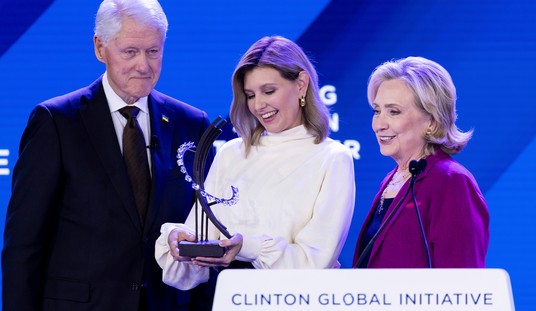One of Donald Trump’s most prominent critics leading up to his talks with Kim Jong-un has hailed his decision to walk out on the North Korean dictator. Susan Rice, a former national-security adviser and ambassador to the UN for Barack Obama, had warned that Trump would “cave” to Kim in a New York Times op-ed earlier this week. This morning, however, Rice offered Trump praise for making the right call in the end:
Rice, who also served as ambassador to the United Nations under President Barack Obama, offered rare praise for Trump in an interview with NPR in the wake of his decision to cut short a two-day summit with Kim once it became clear that no deal to fully denuclearize North Korea could be reached. …
“For the United States to have agreed to lift all sanctions in the absence of real and complete denuclearization would have been a tremendous mistake,” she said.
Rice added the optimal deal would have been to have incremental commitments towards shuttering North Korea’s nuclear program in exchange for lifting targeted sanctions. But such as a deal “apparently was not achievable” with Kim insistent on lifting all sanctions.
Rice’s comments about North Korea’s continued pursuit of nuclear weapons and ballistic missiles are well taken, even if both could easily be applied to the Iran deal signed by the president she served. It’s still good to learn the hard way as long as one learns. Otherwise, give Rice legit kudos here for assessing the outcome by the same standard she laid out earlier in the week. It would have been very easy to shift goalposts here and crow over Trump’s lack of a deal while ignoring that it was Trump who scotched it, and for good reasons.
How did our allies closest to the situation assess the outcome? Did the lack of an agreement from the Hanoi summit make it a failure with Japan and South Korea? Not at all, apparently. NBC News reports that both Japan and South Korea are breathing “a collective sigh of relief,” with specific praise for Trump in resetting the dynamic with Kim:
Some of the countries living in fear of Kim Jong Un’s arsenal appeared to heave a collective sigh of relief Thursday even though President Donald Trump abruptly left the nuclear summit with North Korea without an agreement. …
Trump showing strength by walking away from the negotiating table was preferable to him meeting Kim’s demands, according to Tomohiko Taniguchi, one of Japanese President Shinzo Abe’s senior policy advisers.
While Tokyo has long wanted a deal, ensuring it’s the right deal is crucial, Taniguchi said.
“This ‘friendly walk-away’ was much better than giving a wrong signal to Kim Jong Un,” he added. “Mr. Trump succeeded in setting in place the kind of dynamics between the two — one begging and the other refusing.”
That’s a point I also make in my column this morning at The Week. Kim almost certainly knew how badly Trump could use a big foreign-policy success and how tempting it would be to go the Iran-deal route to get it. By walking away, Trump demonstrated to Kim that he’ll need to get serious to bring an end to sanctions:
And yet in the end, Trump walked away in Hanoi. The man who bragged about his superior abilities to cut deals walked out on the leader he had spent the past year praising as one of his best friends on the world stage. But in doing so, Trump might have built even more credibility for the next round of negotiations. …
Perhaps Kim came to Hanoi with the same assumptions that Trump’s critics made — that he needed a foreign-policy win badly enough to consider out-of-the-box proposals to get it, not just to overshadow the scandal back home, but to make an argument for his re-election campaign in 2020. By hanging tough, Kim might have assumed that Trump would cut any kind of deal just to get to the signing ceremony.
By walking away from the table, Trump has established more credibility in this relationship and in future talks. It will certainly surprise Trump’s domestic critics, and perhaps it will surprise Kim enough to recalculate what he’s willing to concede the next time the two meet. Trump made it clear that a bad deal is worse than no deal at all, and that may produce a better working environment — both in Pyongyang and in Washington.
The end in Hanoi is clearly not an unqualified success. Trump still hasn’t made a dent in the determination in Pyongyang to hoodwink the international community about his nuclear weapons and missile programs. The two nations still don’t even yet agree on precisely what “denuclearization” is. Still, the sudden decision to walk away from a bad deal should make an impression on Kim, and that might make the next round of talks a little more serious.
Addendum: Other Trump critics are less impressed, which prompted another unlikely defender to come forward to rebuke them:
The hashtag #TrumpFail is trending and I find it inappropriate. People should not be hoping the President fails or taking pleasure in his failure on the global stage. Whether you like @realDonaldTrump or not, he represents America in foreign affairs. We want America to succeed.
— Ted Lieu (@tedlieu) February 28, 2019
It’s a good point, one worth endorsing regardless of who is president. Kudos to Lieu for making it here. Note that Lieu is not dismissing the idea that this is a failure, but just the manner in which that opinion is being promoted.








Join the conversation as a VIP Member